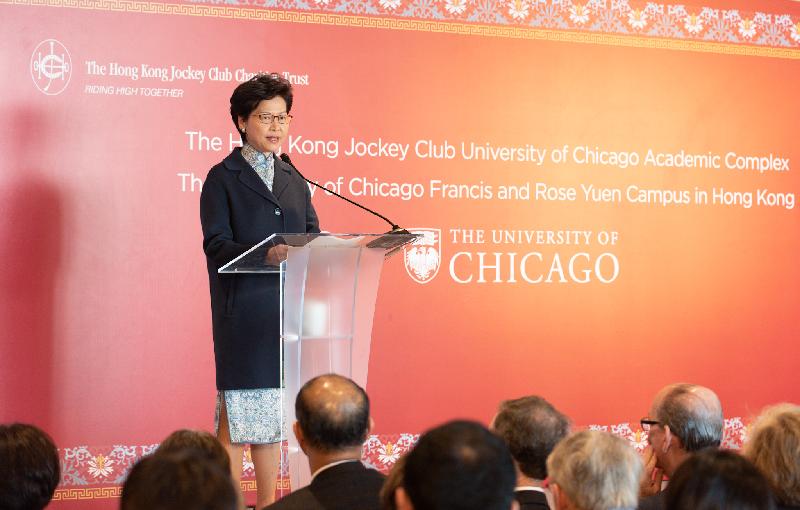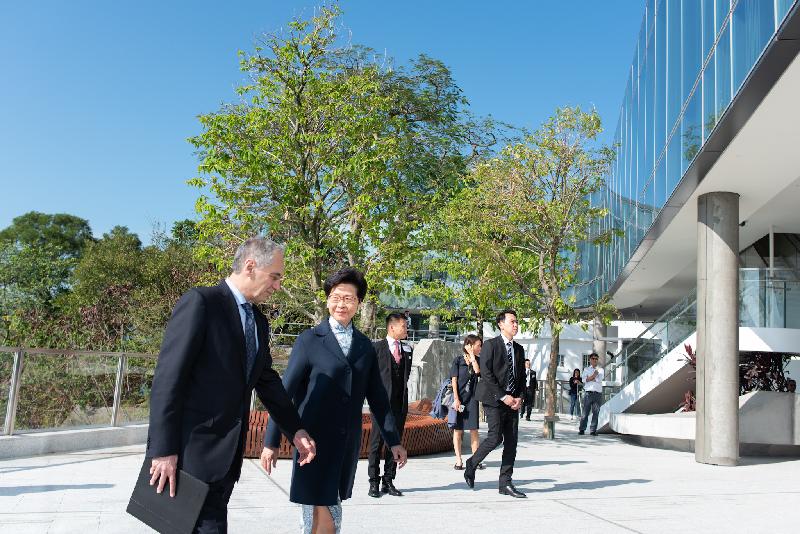Speech by CE at University of Chicago Francis and Rose Yuen Campus in Hong Kong opening ceremony (English only) (with photos/video)
******************************************************************************************
Professor Zimmer (President of the University of Chicago, Professor Robert Zimmer), Anthony (Chairman of the Hong Kong Jockey Club, Mr Anthony Chow), Francis, Rose (University Trustee of the University of Chicago and donor, Mr Francis Yuen, and his wife, Mrs Rose Yuen), distinguished guests, ladies and gentlemen,
Good afternoon. It's a great pleasure to join you today for the grand opening ceremony of the University of Chicago Francis and Rose Yuen Campus. I have been looking forward to this day since I officiated with Professor Zimmer at the naming ceremony of this centre in 2016 as the Chief Secretary for Administration. I am glad that, after two years, this magnificent new university centre, a US$75 million restoration and construction development, is now officially open.
Higher education institutions are essential to creating the talent we need to succeed in the global economy. They are also essential in connecting people, institutions, business and governments. That is indeed the case today, as we formally welcome one of the world's most prestigious universities, the University of Chicago, and the second-oldest business school in the United States, the University of Chicago Booth School of Business, to Hong Kong. The University of Chicago Francis and Rose Yuen Campus will serve as the Asian base for Chicago Booth's flagship Executive Master of Business Administration (EMBA) Programme. It will, as well, be home to the University's student abroad programme.
I am pleased to note that the complex also features the Hong Kong Jockey Club Programme on Social Innovation. A partnership between the Hong Kong Jockey Club Charities Trust and the University of Chicago, this Programme offers a range of opportunities, including scholarships, social entrepreneurship workshops, and training for NGO professionals. Next week, I understand it will host the Global Launchpad, a four-month training programme designed to provide social entrepreneurs with the tools, coaching, and hands-on learning needed to effectively grow their early-stage ventures.
Today's opening underlines my Government's commitment to strengthening Hong Kong's status as a regional education hub, and to the internationalisation and diversification of our higher education sector. Our internationalisation measures include expanding quotas for non-local student admission, setting up a Government Scholarship Fund for outstanding local and international students, and allowing students from outside Hong Kong to stay here without limitation for up to 12 months after graduation. As for diversification, we encourage international institutions to set up in Hong Kong through such measures as our Land Grant Scheme, the Quality Enhancement Support Scheme and the Research Endowment Fund.
We are glad to see that our efforts have started to bear fruit. This stunning new campus was made possible through our Land Grant Scheme, and will surely be a win-win for both Chicago Booth and for Hong Kong. For Chicago Booth, Hong Kong is an ideal choice for recruitment of quality students in the region given its excellent connectivity, diversity and vibrancy in the city. For Hong Kong, we are pleased to have another world-renowned EMBA programme provider in our city which would help establish Hong Kong as a quality education platform for both local and non-local students.
Indeed, 130 EMBA students have enrolled in the two-year programme. They come largely from Hong Kong, but also from all over Asia as well, including India, Indonesia, Japan, Malaysia, Singapore and the Mainland. Mainland students are taking part, I should add, through a pilot scheme introduced with the support of the Ministry of Education of the Central People's Government. In place since the 2017/18 academic year, it offers Mainland students placement in full-time locally accredited, non-local programmes here.
The opening of this new campus also marks the successful completion of a heritage conservation and revitalisation project. The campus, which rises from two heritage buildings, is situated on a historically important site. From the late 1930s, it was part of the British Army's Jubilee Battery, used in the defence of Hong Kong during the Second World War. Later, it became home to the Victoria Road Detention Centre, known as the "White House". In 2010, during my term as Hong Kong's Antiquities Authority in my then official capacity as the Secretary for Development, the compound was accorded Grade 3 historic building status by the Antiquities Advisory Board. And now, we have here a unique landmark reflecting Hong Kong's architectural traditions and heritage.
I understand the public is welcome to enjoy its beauty, and the history that surrounds it, through the Hong Kong Jockey Club University of Chicago Heritage Courtyard and Interpretation Centre. I learnt that guided tours and exhibitions will begin next week. The scenic trail running through and around the site, with its spectacular sea views, will also be open to the public.
I would like to take this opportunity to join Professor Zimmer in paying tribute to the late Bing Thom, the lead architect of this project. Bing was also the designer of the Xiqu Centre in the West Kowloon Cultural District, which will be formally opened early next year. We are indebted to him for his work which has greatly enriched Hong Kong's architectural scene.
Finally, my thanks to the University of Chicago and Chicago Booth, to the Hong Kong Jockey Club, to Francis and Rose Yuen, and to many others who are involved in this wonderful project. Thank you for making this historic site come to a brilliant life. I wish the Centre all the best in its many endeavours.
Thank you very much.
Ends/Friday, November 30, 2018
Issued at HKT 15:36
Issued at HKT 15:36
NNNN
Photo
Audio / Video
CE attends University of Chicago Francis and Rose Yuen Campus in Hong Kong opening ceremony




